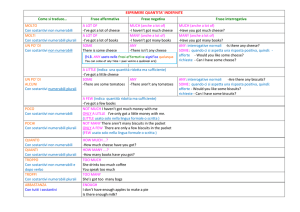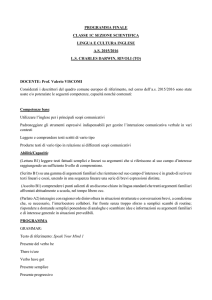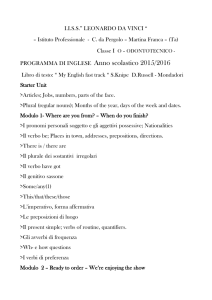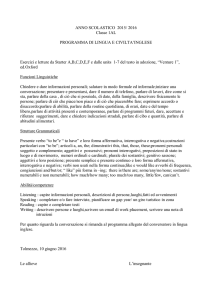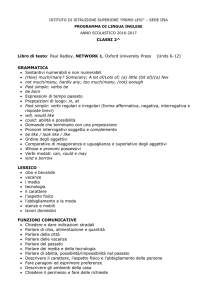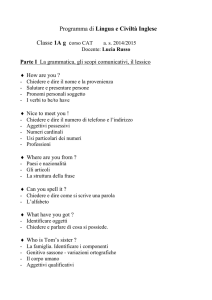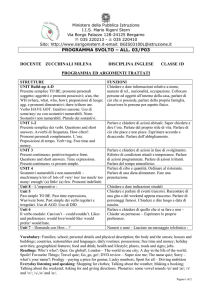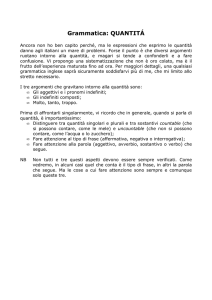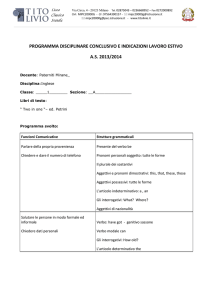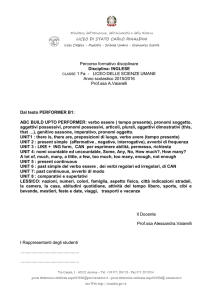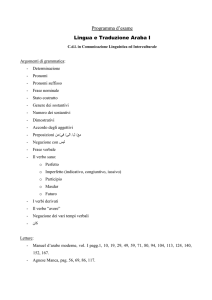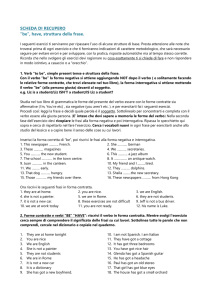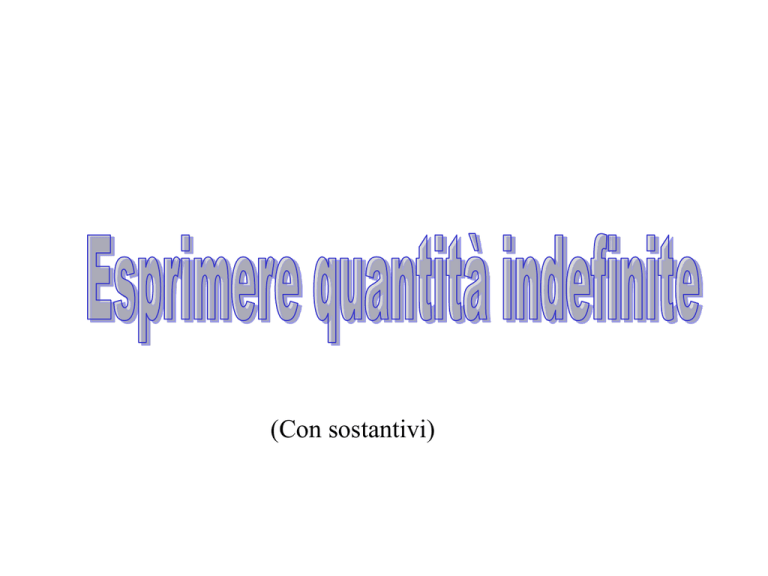
(Con sostantivi)
ESPRIMERE QUANTITA’ INDEFINITE
Come si traduce…
Frase affermativa
Frase negativa
Frase interrogativa
MOLTO
Con sostantivi non numerabili
MOLTI
Con sostantivi numerabili plurali
A LOT OF
-I’ve got a lot of cheese
A LOT OF
-I’ve got a lot of books
MUCH (anche A LOT OF)
-I haven’t got much cheese
MANY (anche A LOT OF)
-I haven’t got many books
MUCH (anche A LOT OF)
-Have you got much cheese?
MANY (anche A LOT OF)
-Have you got many books?
UN PO’ DI
Con sostantivi non numerabili
SOME
There is some cheese
ANY /NO
-There isn’t any cheese
There’s no cheese
ANY: interrogative normali
SOME: offerte/richieste
UN PO’ DI
ALCUNI
Con sostantivi numerabili plurali
A LITTLE
-I’ve got a little cheese
SOME
ANY /NO
-There are some tomatoes -There aren’t any tomatoes
-There are no tomatoes
(N.B. ANY usato nelle frasi affermative significa qualunque
You can come at any time = puoi venire a qualsiasi ora)
A FEW
-I’ve got a few books
POCO
Con sostantivi non numerabili
TROPPO POCO
POCHI
Con sostantivi numerabili plurali
TROPPI POCHI
NOT MUCH I haven’t got much cheese
LITTLE I have got little cheese
TOO LITTLE There’s too little salt in this soup
NOT MANY I haven’t got many tomatoes
FEW I have got few tomatoes
TOO FEW There are too few car parks in this town
QUANTO
Con sostantivi non numerabili
QUANTI
Con sostantivi numerabili plurali
HOW MUCH …?
-How much cheese have you got?
HOW MANY ….?
-How many books have you got?
TROPPO
Con sostantivi non numerabili e
dopo verbo
TROPPI
Con sostantivi numerabili plurali
TOO MUCH
She drinks too much coffee
You speak too much
TOO MANY
She’s got too many bags
ABBASTANZA
Con tutti i sostantivi
ENOUGH
I don’t have enough apples to make a pie
Is there enough milk?
ANY: interrogative normali
SOME: offerte/richieste
-Is there any cheese?
-Would you like some cheese?
-Can I have some cheese?
-Are there any tomatoes?
-Would you like some tomatoes?
(se ci si aspetta una risposta positiva) -Can I have some tomatoes?
Traduco:
CON AGGETTIVI o AVVERBI
Con VERBI
TROPPO
TOO
This suitcase is too heavy
I’m too tired to cook tonight
TOO MUCH
He earns too much
MOLTO
VERY (ma anche terrribly, awfully, extremely)
I’m very tired
I’m awfully tired
She can cook very well
(VERY) MUCH / A LOT
I like him very much / a lot
Ma con study, try, work si usa HARD
He’s working hard to get a pay rise
PIUTTOSTO
QUITE / RATHER
Uncle John is rather/quite old
We meet our friends quite/rather often
She can cook quite well
NB con aggettivi come right, wrong, different,
impossibile -> QUITE = completamente
You’re quite right = hai proprio ragione
Molto/un po’ con i
comparativi
It’s much / a lot earlier…
It’s a little/ a bit earlier..
UN PO’
A BIT / A LITTLE
I’m a little /a bit bored
POCO
Forma negativa del verbo + VERY + aggettivo
Bob isn’t very lucky
Forma negativa del verbo + MUCH +
aggettivo
Mary doesn’t study much
ABBASTANZA
aggettivo + ENOUGH
Is the flat big enough for the whole family?
He’s old enough to know how to behave
verbo + ENOUGH
Do you practise enough?
NON
ABBASTANZA
Forma negativa del verbo + aggettivo + ENOUGH
He isn’t strong enough
He doesn’t play well enough
Forma negativa del verbo + ENOUGH
You don’t practise enough
BOTH
I’m like my dad. We both love sport
Va messo:
-prima del verbo
We are both lazy
We’ve both got blue eyes
Both (of) these cars are brand new
Both of us/you/them study here
Both my aunt and my uncle work in hospital
They are both doctors
-dopo be
-fra have e got
Both (of) + nome plurale
Both of + pronome complemento
Nella struttura
Both… and …
NEITHER
Non si usa both nelle frasi negative. Al suo posto si usa neither.
Both of them are not ready (incorrect)
Neither of them is ready (correct)
Neither of our cars has enough petrol so we have to take the bus
Neither John nor Fred likes doing the dishes.

